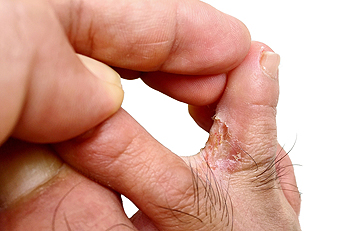 Corns can form on the tops or sides of the toes. They develop as a result of friction that can be caused by wearing shoes or socks that do not fit correctly. The noticeable symptoms often consist of pain and tenderness in the affected area, and it may be difficult to wear constricting shoes. Wearing larger shoes may prevent excess friction, so this may be a successful method in preventing corns from developing. For corns that are newly formed, patients may find mild relief after soaking their feet in warm water, followed by moisturizing the area where the corn is. This may help to soften the corn, and then a pumice stone may be an effective method in gradually diminishing it. For more severe corns, it is suggested to consult with a podiatrist who is able to perform different forms of treatment.
Corns can form on the tops or sides of the toes. They develop as a result of friction that can be caused by wearing shoes or socks that do not fit correctly. The noticeable symptoms often consist of pain and tenderness in the affected area, and it may be difficult to wear constricting shoes. Wearing larger shoes may prevent excess friction, so this may be a successful method in preventing corns from developing. For corns that are newly formed, patients may find mild relief after soaking their feet in warm water, followed by moisturizing the area where the corn is. This may help to soften the corn, and then a pumice stone may be an effective method in gradually diminishing it. For more severe corns, it is suggested to consult with a podiatrist who is able to perform different forms of treatment.
Corns can make walking very painful and should be treated immediately. If you have questions regarding your feet and ankles, contact Scott Matthews, DPM, MD of Salem Foot Care . Our doctor will treat your foot and ankle needs.
Corns: What Are They? And How Do You Get Rid of Them?
Corns are thickened areas on the skin that can become painful. They are caused by excessive pressure and friction on the skin. Corns press into the deeper layers of the skin and are usually round in shape.
Ways to Prevent Corns
There are many ways to get rid of painful corns such as:
- Wearing properly fitting shoes that have been measured by a professional
- Wearing shoes that are not sharply pointed or have high heels
- Wearing only shoes that offer support
Treating Corns
Although most corns slowly disappear when the friction or pressure stops, this isn’t always the case. Consult with your podiatrist to determine the best treatment option for your case of corns.
If you have any questions please feel free to contact our office located in Wikesboro, NC . We offer the newest diagnostic and treatment technologies for all your foot and ankle needs.
